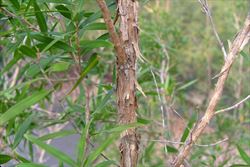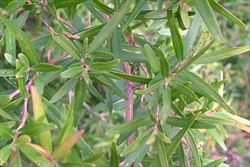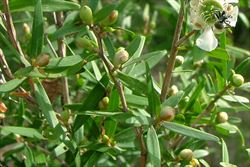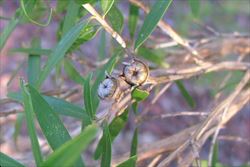Click on images to enlarge

habit (Photo: Sheldon Navie)

bark on main stem (Photo: Sheldon Navie)

leaves (Photo: Sheldon Navie)

close-up of younger leaves (Photo: Sheldon Navie)

flower buds (Photo: Sheldon Navie)

close-up of flower (Photo: Sheldon Navie)

immature fruit (Photo: Sheldon Navie)

mature fruit (Photo: Sheldon Navie)
Scientific Name
Leptospermum petersonii F.M. Bailey
Synonyms
Leptospermum citratum Challinor, Cheel & A.R. PenfoldLeptospermum flavescens Sm. var. citratum J.F. Bailey & C.T. White
Family
Myrtaceae
Common Names
common teatree, lemon tea tree, lemon tea-tree, lemon scented tea tree, lemon scented teatree, lemon-scented tea tree, lemon-scented tea-tree, lemon-scented teatree
Naturalised Distribution
This species is naturalised beyond its native range in the coastal districts of central New South Wales and is sparingly naturalised in southern Victoria. Also naturalised overseas in Hawaii.
Notes
Lemon-scented tea-tree (Leptospermum petersonii) is regarded as a minor or potential environmental weed in Victoria and the coastal districts of central and southern New South Wales. For example, it is listed as a potential environmental weed or "sleeper weed" in Frankston City in southern Victoria.
This species grows naturally in the vicinity of wet sclerophyll forests and rainforest north from Port Macquarie on the mid-north coast of New South Wales. It is widely cultivated in other parts of Australia and has become naturalised in native vegetation near Sydney and Melbourne. While this species is yet to have a significant impact, it is regarded as a potential environmental weed because the closely related coastal tea-tree (Leptospermum laevigatum) has become a serious environmental weed outside its native range in Australia.

